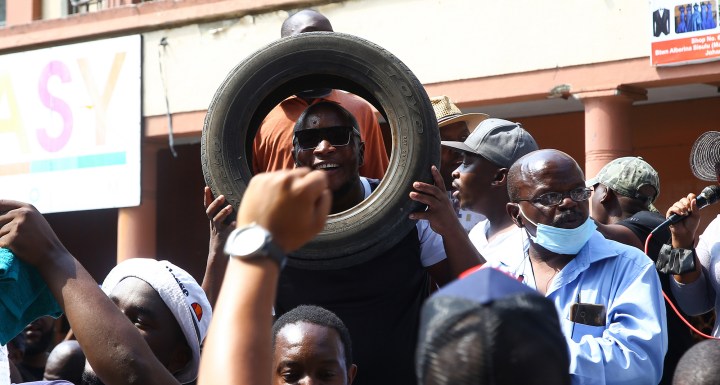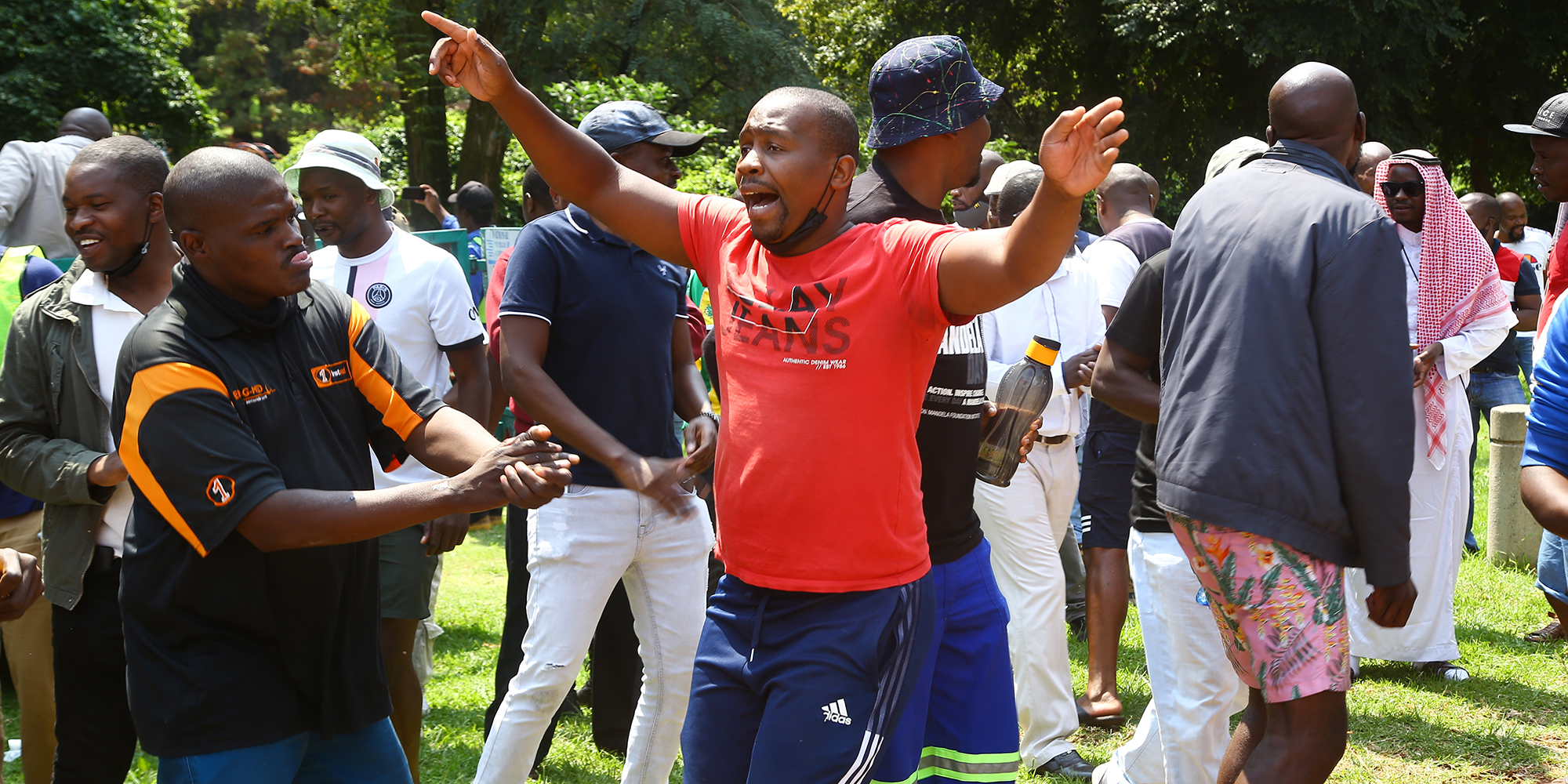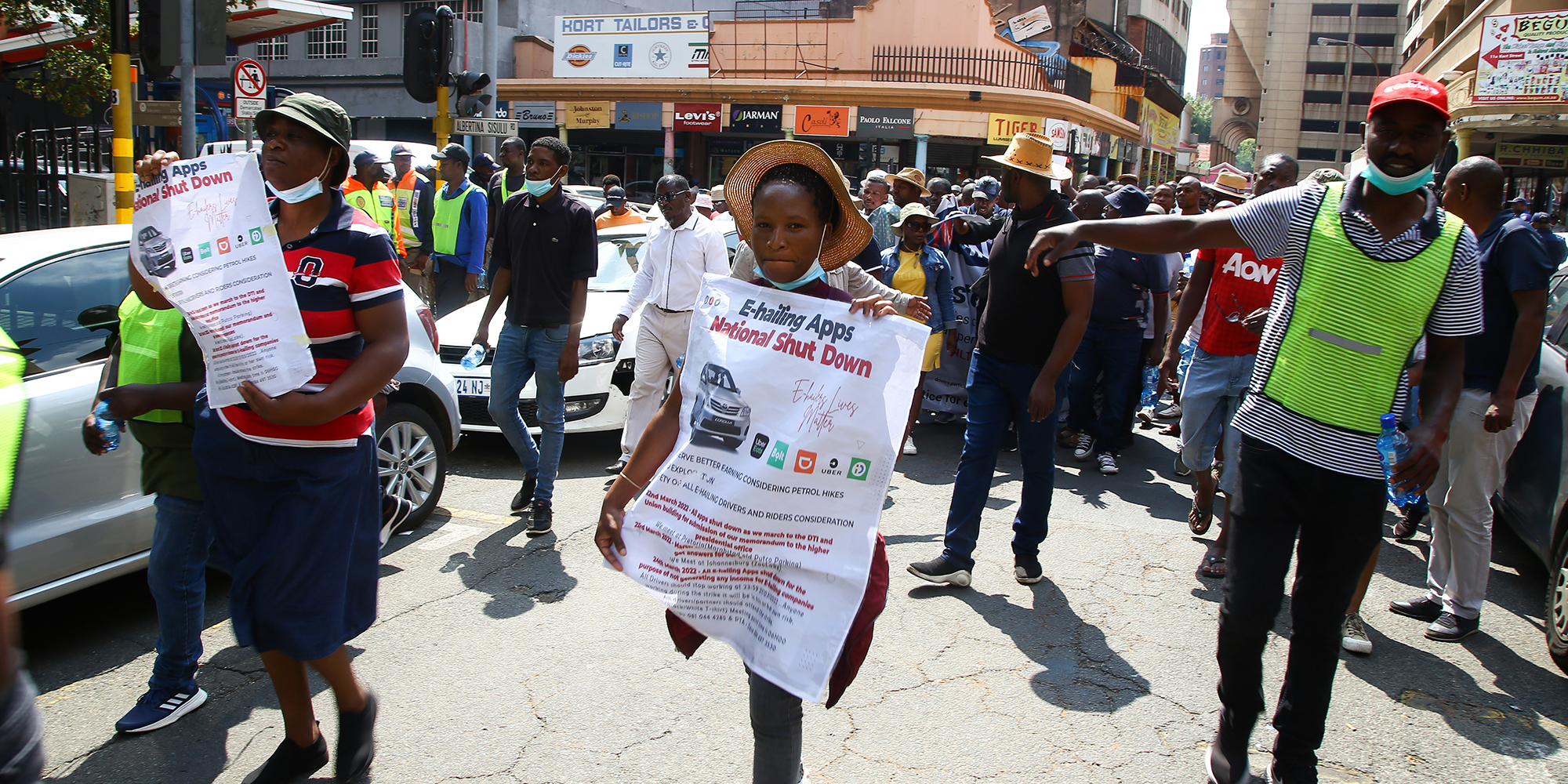E-HAILING PROTEST ACTION
Three-day strike has ripple effect on drivers, business owners and customers as everyone’s under pressure

South Africans were hit for three days this week by an e-hailing strike against the government’s failure to regulate the industry. Daily Maverick followed up on the impact and response from authorities.
On Tuesday, e-hailing drivers and operators in South Africa staged protests to draw attention to exploitation, low wages, lack of regulation of e-hailing companies and safety issues in the industry.
In March 2020, the National Land Transport Amendment Bill was passed by Parliament to regulate e-hailing standards and requirements, but it is yet to be enacted. The protest, therefore, was intended to pressure the government to implement and enforce the regulation.
Vhatuka Mbelengwa, national spokesperson for Unity in Diversity (UID), the body representing e-hailing driver-partners, owners and drivers, said only the Presidency has responded to their demands.
Uber, Bolt, Didi and Indrive drivers protest over lack of regulation and app firm exploitation
“Thus far, the office of the President has responded to our memorandum [by] directing us to engage [with] the Department of Transport and the Department of Trade, Industry and Competition [dtic] to address our concerns.”
In a response to Daily Maverick on Friday, the Transport Department said: “The e-hailing service is regulated in terms of the National Land Transport Act of 2009, that, everyone who provides a public transport service for reward must have the necessary operating licence. Further, regulations of e-hailing services are in the National Land Transport Amendment Bill, which is before Parliament for processing.
“Most of the issues raised, such as low wages and exploitation, are beyond the Department of Transport’s mandate but are labour matters that the industry needs to take up with the Department of Labour and Employment. The safety aspect is a challenge that the law enforcement is always on the alert to deal with as and when it happens, it is a crime issue that needs to be reported to the police by commuters and operators alike, so that perpetrators can be prosecuted,” said the department’s spokesperson Collen Msibi.
Disgruntled drivers and owners from Uber, Bolt, DiDi and inDrive began their three-day protest by switching off their apps. This meant both food delivery and ride services were either unavailable or took longer than usual.
Uber and Bolt are the most used and popular e-hailing services in the country.
The disruption of services was catastrophic for customers and operators making a living out of the e-hailing service.
Bolt and Uber have acknowledged the impact, with Uber’s head of mobility operations for Sub-Saharan Africa Kagiso Khaole, saying, “We are aware that the strike may have impacted some riders’ ability to request a ride and longer expected time of arrival as a result”.
Gareth Taylor, SADC regional manager for Bolt, told Daily Maverick: “We have had feedback from some customers that they have to wait longer for rides to arrive than usual and that food deliveries take longer than normal too.
“Our food team have been in frequent communication with couriers and restaurants and were managing demand with base delivery fees surging and delivery radius reduction. There have been no changes to courier fee pricing during these protests.”
The strike started in Gauteng and spread to KwaZulu-Natal and the Western Cape. And customers are unhappy. Klass Monama, a resident of Terenure, Kempton Park, said he had tried to get a ride for two consecutive days, with no driver response: “On Tuesday, I had planned to go to the office but had no idea the e-hailing operators were on strike. I waited for three hours… Ultimately, I gave up and moved my plans to later after lunch so I can get enough time to catch a taxi.
“On Wednesday again… I had to rush to Centurion for a cricket game, and again not having their service meant that I had to take a few taxis to get to the Gautrain station. Fortunately, the game also ended early so public transport wasn’t an issue coming back. However, I was prepared to leave during the game to be sure that I would make it back home safely. Despite the ride services being unavailable the prices also kept fluctuating. In normal circumstances, a trip of about R240 on Uber and Bolt shot up to R441.”
Nkanyiso Mabaso, an owner-driver with Bolt based in Durban, claimed that part of the reason drivers and delivery services were unavailable was that some drivers were intimidated for choosing not to protest. He said: “Whilst the convenors of the strike have said every driver has the right to protest or not protest, some drivers who choose to continue to operate and earn an income have been intimidated, attacked and victimised of their choice. I am no exception to the victimisation.

E-hailing drivers march to the offices of the Gauteng MEC For Transport during their national shutdown protest on March 23, 2022 in Johannesburg, South Africa. According to media reports Uber, Bolt, Didi and Indrive drivers are protesting over the lack of regulation and app firm exploitation. (Photo: Gallo Images/Luba Lesolle)
“I was called igundwane [rat] and threatened to be beaten up and my car burnt for continuing to work… I chose not to participate in the protests simply because I couldn’t afford a day of not working. I am not making any fortune from this e-hailing service. It’s a hand-to-mouth situation… no work, no pay, no food for myself and the family”.
For the owners, drivers and e-hailing companies, the strike meant no income, which has a ripple effect.
“The three-day protest has been hard on all drivers as we were not getting any income, but it’s a sacrifice we are willing to take, given the exploitation from these e-hailing companies,” said Uber driver Nkosinathi Zwane.
“As a driver, I currently make around R600 after expenses a day on the Uber platform, so the amount I have lost in the three days amounts to around R1,800.
“I’m renting the car and the owner is expecting his full R2,500 on Monday, so before I even stress about my needs like money for food and my child I’m worried about losing the car…
“I think it will take two weeks for me to be back on track to have money for my family after the strike. For the next three days, I will be working to pay for the car.
“If we get some of the things we want, like fares to increase and [commission to decrease] … it might be worth it because we have protested in the past and got nothing.”
Mbelengwa said throughout their protest, they had received enormous support from society and other civic organisations.
“The fact that a powerful organisation like Cosatu and its affiliates have voiced and said they will support us… that is an impact we have been struggling to bring about for years. Also, how the MECs and other government officials across the country have received our memorandums is an affirmation of them recognising the concern of the industry.
“Thursday was our final day of the official protest. From here, ours is to continue putting pressure up until we get the required response and intervention from the dtic. As the e-hailing community, we wish to express gratitude to society at large for your due consideration and support over the three-day shutdown of the e-hailing sector.

E-hailing drivers march to the Johannesburg offices of the Gauteng MEC for transport during their national shutdown protest on 23 March 2022. (Photo: Gallo Images / Luba Lesolle)
“We also apologise for any disruption to your personal lives; it was not an easy approach, but certainly, one we deemed necessary to alert society on the exploitative, unsafe nature brought about by Uber and Bolt within South Africa,” told Mbelengwa.
Bolt and Uber respond
Addressing some of the complaints by e-hailer operators, Bolt and Uber said they have already taken several steps towards resolution.
Uber’s Khaole said the company engages regularly with drivers and not just ahead or during protests. “We take the concerns of drivers seriously and are currently engaging directly using our various engagement channels to work towards addressing the issues. Our commitment to drivers is to continuously find ways of maximising their earning potential while meeting the needs of the riders.”
Taylor said: “Bolt has had extensive engagements with the team that drafted the National Land Transport Amendment Bill to provide industry-specific insights. Bolt looks forward to the approval of the National Land Transport Amendment Bill that will create clarity for all stakeholders in the South African transport sector.”
Allegations of exploitation
Drivers who use the platform can choose their work hours and locations. More than 40,000 drivers use the platform in South Africa, connecting to passengers who are looking for an affordable door-to-door mode of transport, said Taylor.
Pricing
When setting prices, Bolt balances the earning needs of drivers with affordability for passengers, he said. More people will choose to ride with Bolt if rates are affordable, which means that drivers have more opportunities to earn money. Bolt increased its rates by up to 20% in March 2022, with increases implemented on the minimum fare, start rate, kilometre rate, and trip cancellation rate, said Taylor.
Commission
Taylor said the commission paid by drivers to access the platform to connect with riders comprises up to 23% of the total fare, excluding the booking fee, which is less than other large players in the e-hailing industry. Drivers in smaller and newly launched regions pay lower commission rates in conjunction with the lower average hourly earnings. Bolt drivers keep between 6% and 13% more per trip than drivers using other platforms.
Bolt uses this commission to fund:
- Discounts that encourage passengers to ride more, and encourage new passengers to sign up to the platform;
- Drivers’ bonus incentives and guarantees;
- Operations, premises, customer support as well as maintaining the platform; and
- Marketing.
Safety
Taylor said the safety of drivers and passengers is a top priority for Bolt, and they condemn any violence directed at customers or drivers.
“Bolt continues to look for ways to make e-hailing safer for everybody, in consultation with the SAPS, the Department of Transport, and other stakeholders, while we continue to offer a way that more than 40,000 drivers can earn an income, and millions of people in South Africa can benefit from affordable door-to-door transport.” DM
The DTIC had not responded to Daily Maverick’s questions by the time of publication.




















 Become an Insider
Become an Insider
Comments - Please login in order to comment.